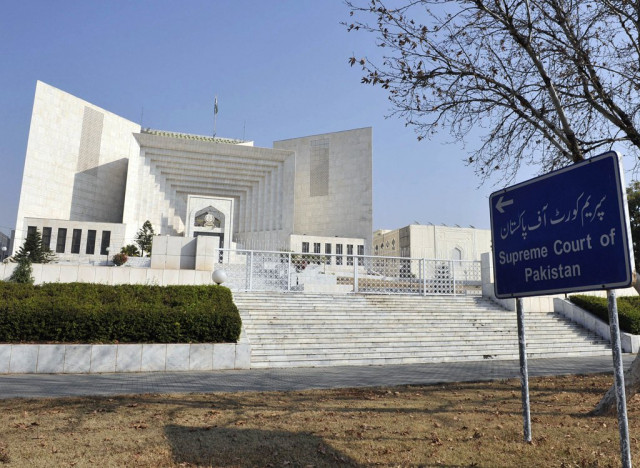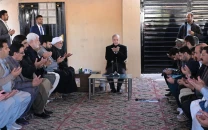On money matters, judiciary showing restraint
SC has been suggesting alternative measures to avoid costing country in international arbitration

PHOTO: AFP
In the past, Supreme Court intervention in financial agreements has badly affected the country’s position before international courts. Likewise, Pakistan is facing billions of rupees in damages in different cases where the SC had intervened and scuttled or otherwise affected financial deals with foreign companies.
The present judiciary led by CJP Nisar has not only shown restraint in such matters but has even been ready to extend its cooperation in resolving disputes which may arise in the wake of the development of the China Pakistan Economic Corridor (CPEC).
Our restraint should not be considered weakness: CJP
A three-judge SC bench headed by CJP Nisar on February 12 rejected a petition against the award of a liquefied natural gas (LNG) import contract.
A senior lawyer told The Express Tribune that though one of the respondent parties had engaged him to plead their case, he is happy that the SC rejected the petition before his appearance. He believes that the decision not to intervene in the matter is in the interest of both court and state.
Even during the hearing, the CJP also observed that the SC does not want to repeat the episodes of Reko Diq or Pakistan Steels Mills, where the country suffered huge financial losses due to the court’s intervention. He also referred to the Karkey rental power project case, where international arbitrators penalized Pakistan with Rs80 billion in damages. The arbitrators also raised serious questions on the conduct of the Supreme Court.
Similarly, the chief justice sought records of the Pakistan Steel Mills case. During the hearing on Thursday, the chief justice asked senior lawyer Khalid Anwar about his opinion regarding the SC’s 2006 judgment that had halted the privatisation of Pakistan Steel Mills. The counsel replied that it was “a bad verdict”, adding that he had filed a very comprehensive review petition on behalf of a respondent, but it was dismissed in his absence while he was on general adjournment.
One section of lawyers believe that the larger bench judgment on privatisation of PSM should be revisited. The country is facing billions of rupees loss due to the SC’s 2006 ruling.
Meanwhile, the CJP on February 3 held a special meeting of all high court chief justices to consider a mechanism to resolve disputes relating to CPEC. The purpose of the meeting was to share views about dispute resolution mechanism for Chinese investors and the Government in Pakistan.
During the meeting, SC judge Justice Mushir Alam informed that with CPEC investment in Pakistan, there is the likelihood of increased civil and criminal disputes. He emphasised the need for a one-law mechanism for participating countries and that all the countries should adopt a uniform mechanism for dispute resolution. He further emphasised the need for an international research centre for dispute resolution in Islamabad, for which the judiciary may provide support. He further suggested that a conference of the chief justices of participating countries may be held.
SC Justice Mansoor Ali Shah emphasised the need for a forum on the lines of Dubai IFC to look after foreign investment.
Law and Justice Commission of Pakistan Secretary Dr Muhammad Raheem Awan said there 48 Bilateral Investment Treaties with Pakistan are in place, out of which one is with China which covers disputes and provide direct recourse to foreign investors to refer the dispute for arbitration to the World Bank. He suggested the establishment of a similar dispute resolution mechanism.
Last week, the apex court also formed a three-member committee led by State Bank of Pakistan Governor Tariq Bajwa for developing guidelines to retrieve money stashed abroad illegally by Pakistani citizens in banks and properties.
The other members of the committee are Finance Secretary Arif Ahmed Khan and the Federal Board of Revenue (FBR) chairperson. They were given a week to come up with concrete solutions and actionable plans.
During the hearing, Justice Umar Ata Bandial made it clear that the purpose behind this exercise was not to create panic among the general public, but to identify lacunas in the law by pointing out transfers of large sums and assets by those using illegal channels and without paying taxes.
Justice Bandial also asked the SBP governor to consider extending incentives to people, rather than discouraging them, so that they would invest in Pakistan or bring their money back.
The SC led by former chief justice Iftikhar Muhammad Chaudhry had adjudicated on numerous international financial deals during the PPP regime, including LNG contracts, rental power projects, and the Safe City Project. These include the Karkey case.
In 2012-13, then-NAB prosecutor general KK Agha attempted to settle the issue with Karkey, but Justice Chaudhry stopped his efforts and warned NAB officials of strict action in case a settlement was reached with the Turkish firm.
In the Reko Diq case, arbitrators dismissed Pakistan’s allegations of corruption against the Tethyan Copper Company Pty Ltd (TCC). Later, TCC made a claim of $11.5 billion, which Pakistan rejected. Now the quantum stage has started, with both federal and Balochistan governments involved, and hopes that TCC may agree to an out-of-court settlement.



















COMMENTS
Comments are moderated and generally will be posted if they are on-topic and not abusive.
For more information, please see our Comments FAQ